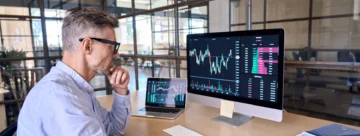Futures Trading: How to Make Money Trading Futures Contracts?

Trading in futures markets can offer a profitable way to make money, but it requires specific knowledge and skills. Basically, the profitability of futures trading depends on many factors, though with proper planning and trading strategy, futures trading can be a successful option for the trader.
Previously, we dealt with the definition of futures and how they work. Now let’s review the strategies for working with futures contracts and how a beginner can succeed in futures trading.
Pros and Cons of Futures Trading

There are several unquestionable advantages of futures trading:
- the possibility of profits from speculative trading;
- a high level of liquidity, which makes it easy to buy and sell futures;
- the availability of different markets and assets, which provides great opportunities for portfolio diversification;
- the ability to hedge against risks associated with changes in asset prices;
- a high level of transparency as futures prices are determined by the real supply/demand ratio in the market.
However, futures trading also has drawbacks, including:
- a high level of risks associated with changes in asset prices and the corresponding financial losses;
- a high probability of price manipulation in the futures market, especially in periods of instability;
- the complexity of understanding the pricing mechanisms and the functioning of the futures market, which requires traders to have extensive theoretical knowledge, familiarity with professional terminology and lingo, and market analysis skills;
- the need for constant monitoring of news that can affect futures prices;
- a high level of competition and difficulty in finding profitable deals.
Futures Trading Strategies

There are plenty of strategies for working with futures that can help traders increase their profits and reduce the risks of losses. Here are some of them:
- Trading with the trend. Traders use technical analysis to determine the current trend in the market and enter a position in the direction of that trend. This strategy helps traders maximize profits from sustained price movements.
- Countertrend trading. Traders look for opportunities to enter a position in the direction of the current trend. This strategy requires experience and can be dangerous because countertrend price movements can be strong and prolonged.
- Range trading. Traders seek opportunities to enter a position when the price is in a certain range. This strategy can be effective during periods of low volatility when the price fluctuates around a certain level.
- News trading. Traders monitor news and economic events that may affect futures prices, then they enter into positions based on this information. This strategy requires a good understanding of the market and the ability to monitor news events and react quickly to them.
- Positioning strategy. Traders open positions for a long period of time to maximize profits from long-term market trends.
One thing to keep in mind is that each strategy has its advantages and disadvantages, and not all strategies are suitable for every trader. Choosing the right strategy depends on individual interests, predispositions, and trading style.
What to Consider for Successful Futures Trading?

When it comes to trading any type of futures, the following will help:
- Technical analysis. Using charts and other tools to analyze and predict price movements of futures.
- Risk management. Taking steps to reduce risks of losses, including setting profit and loss targets, using stop losses, etc. Developing a risk management system helps limit potential losses and protect capital.
- Market knowledge. It’s essential to have a good understanding of the market in which the chosen futures are traded, including its characteristics, liquidity, volatility, and other factors.
- Data analysis. A trader must be able to analyze and interpret data related to the instrument being traded, including prices, trading volumes, open interest, and other indicators.
- Trade planning. A trading strategy must be developed that sets goals and plans based on data analysis and risk management.
- Understanding factors that affect the price. External factors that can affect the price of the traded instrument must be considered. Economic indicators, political events, geopolitical risks, and many others can affect the price of the futures in one way or another.
- Promptness. Successful futures trading requires quick reactions to market changes.
How to Earn from Futures Trading?

To make money in the futures market, a beginner trader should:
- Learn the basics of futures trading and understand their features, including pricing mechanisms and risks.
- Determine investment goals and strategies and set limits on potential losses.
- Acquire sufficient knowledge and skills to trade futures effectively; for example, through educational courses, seminars, or demo accounts.
- Start trading with small amounts of money and then gradually increase the volume of trades once the experience is sufficient.
- Keep an eye on market conditions and news that can affect the price of futures.
- Not bet everything on one deal, but diversify risks.
It’s also important to pay special attention to the psychological aspects of trading in the futures market, which will help beginners achieve success. Among them are:
- Control over emotions. Don’t let your emotions rule your trading decisions, you should keep your thinking rational. Decisions made in a state of anger, fear, or greed can lead to serious losses.
- Accepting the possibility of losing. Desperation and worrying about every failed trade aren’t worth it. It’s more productive to remain calm and be prepared to fail.
- Be ready for market changes. The futures market can be very volatile, so it’s important to have a plan for trading in different scenarios and not to get discouraged.
- Taking a rest. Regular breaks and rest will help keep you energized and focused during the trading day.
To sum up, it’s worth noting that futures are one of the most popular instruments in financial markets. Nevertheless, futures trading is a risky business, and you should be aware of this when deciding to try your hand at it.
The next article from CP Media explores how futures prices are formed and what factors influence the formation of prices in the futures market.











